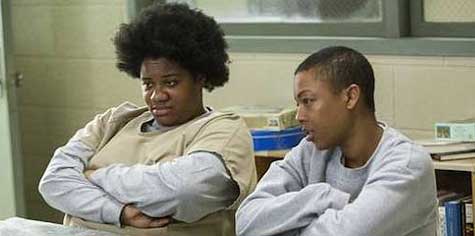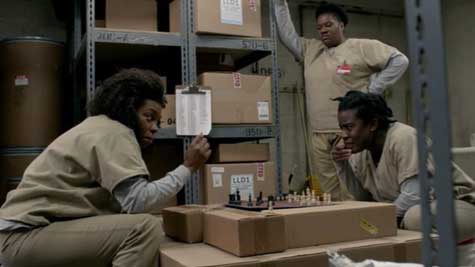
Up to this point in Orange Is The New Black, Cindy “Black Cindy” Hayes (Adrienne Moore) has primarily been a source of comic relief. She’s always mouthing off—“always clowning” as Vee observes. It’s a small stroke of genius that the episode that focuses on her, then, should be titled “Comic Sans.” Like the much maligned font itself—which is so maligned it has entire websites dedicated to its abolition–Cindy is seen as goofy and intrinsically unworthy of respect.
Like nearly every episode this season, however, “Comic Sans” burrows into the past, locating the instigating problem for Cindy. This is another episode where we don’t find out the inmate’s crime. As with Poussey in Episode 6, we don’t find out what landed her inside Litchfield. What we see, instead, is a callow young woman, working at the airport, smoking weed with ex-cons, swiping a pink iPad from a piece of luggage. We meet her mother and her adoring little sister, both of whom seem well-balanced and perplexed by this wayward young woman. There are revelations to come about Cindy—a hidden shame that explains some things about her—but it’s not as if we find “the answer.” Cindy is a mystery, and is a mystery to herself first and foremost.
The only one who seems to see beneath the surface—to intuit that there is something behind the jokes and the pissed off attitude—is Vee. All season long we’ve seen Vee accruing power, and it’s been an extended lesson in manipulation. As I’ve pointed out in previous posts, what has been interesting is the way she has yet to use violence. She didn’t arrive in Litchfield on the first day and kick someone’s ass. Instead, she’s playing a long game. (This episode makes this point explicit for the first time as Vee and Suzanne play chess, and Vee schools her protégée on the importance of thinking a few moves ahead.)

For Suzanne, Vee used love. For Taystee, she used maternal manipulation. For Poussey, she’s using Taystee. We almost expect her to use violence with Cindy, especially after Cindy forces a confrontation over the burgeoning cigarette trade that Vee and her girls are running. But Vee doesn’t use violence. Instead she does what she did with the rest—she reads the younger woman, locates her pain and subtly presses. “You’re funny, aren’t you?” she asks. “Always joking. Always clowning.” When Cindy tries to defend herself, Vee tells her, “You’ve given up on yourself. You’re a loser.” You can’t call this tough love exactly, but it works. Vee maybe harsh, but she’s the first person in a long time who takes Black Cindy seriously as just plain Cindy. It works, too. By the end of the episode, Vee has herself a new recruit.
Elsewhere in the episode, we catch up with Morello. She approaches Piper about working on the prison newsletter. It’s a nice scene, and it’s good to see Morello trying to move past her infatuation with love. When Piper suggests that she write a romance column, Morello demurs, but she perks up when Piper suggests a column on beauty tips. Morello blushes and says, “Just because you’re in prison doesn’t mean you gotta let yourself go.”
The newsletter subplot has arrived at the right time to get Piper back into the lives of the other characters. In addition to Morello, she’s working alongside Diaz and Flaca. The newsletter also gets her involved with the administration, as both Caputo and Healy seem flattered and amused by it. This will, one assumes, help grease the wheels on the chances of the furlough to see her grandmother.
There’s also some ground being laid here for (one assumes) major developments coming down the road. Piper is using the newsletter as a cover for some covert journalism as she looks into that missing two million dollars from the prison budget. We find out that the money is going to Assistant Warden Natalie “Fig” Figueroa (Alysia Reiner) and the state senate campaign of her husband Jason (Peter Rini).
A couple of interesting things happen in the scene with the Figueroas and one of their campaign staffers. For one, we learn that Jason Figueroa is secretly gay. This is done through implication—through glances, through the revelation that the Figueroas aren’t having sex—but if there isn’t a future scene of Jason kissing another man, then I don’t deserve to watch television. This kind of subplot seems—at least at this point—to be little more than just that, a subplot. In a way, it seems like overkill to give Fig a closet case of a husband (this being, like, the hundredth storyline this season), but we’ll see where it goes.

The other interesting thing about this scene, though, nicely demonstrates why I love this show. Both of the Figueroas, we find out, are closeted idealists. They embezzled that money and put new hardships on the inmates, sure, but they did it—or at least they’re telling themselves they did it—because they want to address larger structural issues with the prison and the state penal system. I love this not because I think Fig will be revealed to be some wonderful soul underneath her caustic and uncaring demeanor. I love it because on this show, as in life, everyone has their reasons.
Jake Hinkson, The Night Editor, is the author of The Posthumous Man and Saint Homicide.
Read all posts by Jake Hinkson for Criminal Element.
